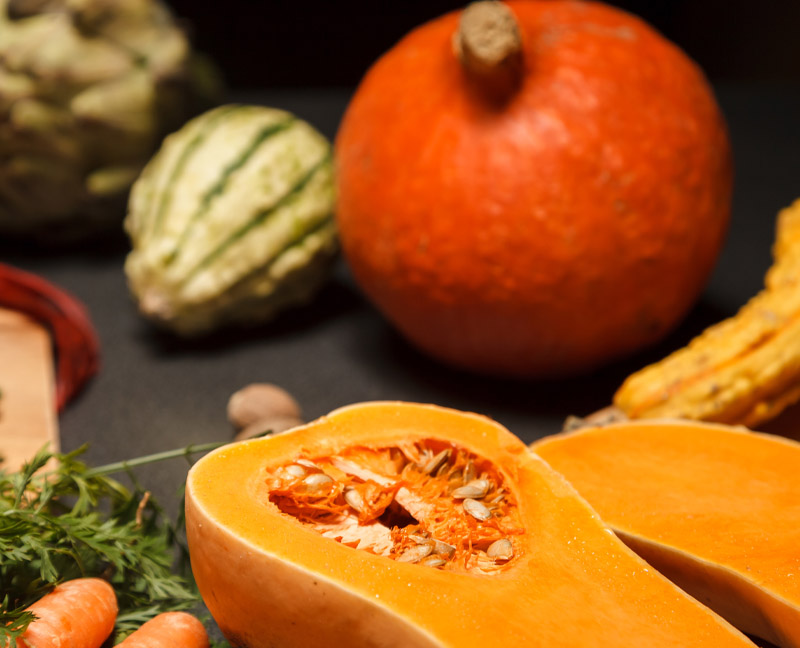Unlocking the Goodness of Winter Squash: A Seasonal Superfood

By Tiffany Rios, RD, CDE, Shore Physicians Group
As the days grow shorter and the air turns crisp, our tables become adorned with the vibrant hues of winter squash. These hearty vegetables are not just a symbol of the changing seasons; they’re a nutritional powerhouse that brings a burst of flavor and health benefits to your autumn and winter meals. In this article, we’ll delve into the varieties of winter squash you should consider, explore the health benefits they offer, and uncover some practical tips for preparing them.
A Variety of Choices
Winter squash comes in a range of shapes, sizes, and flavors. Some of the most common varieties include butternut, acorn, kabocha, delicata, and spaghetti squash. Each type has its unique qualities, making them versatile ingredients to explore in your culinary adventures.
Reasons to Embrace Winter Squash
Let’s break down the three compelling reasons to make winter squash a star in your fall and winter meals:
- Antioxidant Beta Carotene: Winter squash is packed with beta-carotene, a powerful antioxidant. Once ingested, your body converts beta-carotene into essential vitamin A. Beyond its role in supporting healthy vision and skin, studies have linked beta-carotene to a reduced risk of certain cancers. Making winter squash a regular part of your diet can provide your body with a powerful tool for maintaining good health.
- Lower in Calories and Carbs: If you’re watching your calorie or carbohydrate intake, winter squash is a smart choice. Compared to its starchier counterparts like potatoes, it is significantly lower in calories. A typical serving of winter squash contains around 45 calories, whereas potatoes can boast 77 calories per serving. When it comes to carbohydrates, winter squash is a friend to those aiming to manage their carb intake. Spaghetti squash, for instance, tends to contain only 7-10 grams of carbohydrates per one-cup serving.
- Rich in Vitamins & Minerals: Winter squash is a nutritional treasure chest, offering a substantial supply of essential nutrients. A single serving provides a generous 200% of your daily vitamin A needs, vital for maintaining good vision and a robust immune system. Additionally, it delivers around 33% of your daily vitamin C requirements, playing a crucial role in immune function and skin health. Winter squash is also a reliable source of minerals like potassium, magnesium, and calcium, which are essential for a range of bodily functions, including maintaining strong bones and a healthy heart.
Incorporating Winter Squash into Your Diet
Embracing the delicious and healthful attributes of winter squash is easy. You can incorporate them into your diet in numerous ways:
- Add roasted or sautéed squash to salads and grain bowls for extra flavor and nutrition.
- Use squash as a side dish to complement your favorite protein or main course.
- Transform squash into a heartwarming soup, perfect for warming up on chilly evenings.
Tips for Cutting Squash
The thick, tough skin of winter squash can be intimidating to tackle in the kitchen. Here are some tips for making the process more manageable:
- Start with a sharp knife: A sharp knife will make it easier to cut through the tough skin and flesh of the squash.
- Microwave briefly: Pop the whole squash into the microwave for a minute or two to soften the skin slightly. This will make it easier to cut.
- Cut a flat surface: Slice off a small piece from one end of the squash to create a stable, flat surface. This will prevent the squash from rolling around while you’re cutting it.
- Halve or quarter: Depending on your recipe, you can cut the squash in half, then scoop out the seeds, and proceed to slice or dice as needed.
Winter squash is not only a delight for your taste buds but also a boon for your health. As the seasons change, take advantage of the abundance of these vibrant gourds and make them a star in your fall and winter culinary creations. Your palate and your well-being will thank you.
Tiffany Rios is a registered dietitian (RD) and certified diabetes educator (CDE) with Shore Physicians Group, who practices at their Endocrinology Division located at 18 West New York Avenue in Somers Point. She is passionate about promoting healthy eating and nutrition education, and believes in the power of food to nourish both body and soul. For more information, call 609-365-5300.